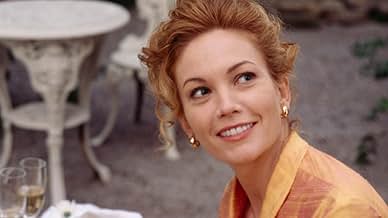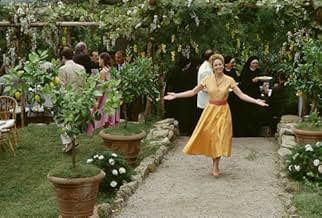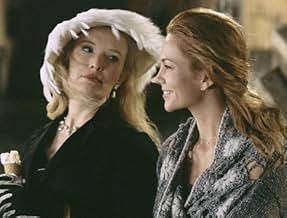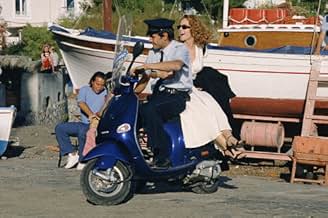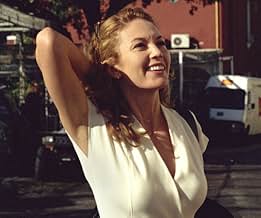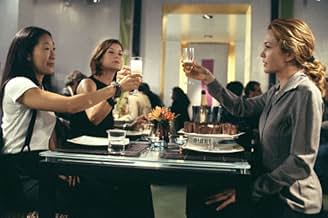IMDb-BEWERTUNG
6,7/10
61.901
IHRE BEWERTUNG
Eine Schriftstellerin kauft impulsiv eine Villa in der Toskana, um ihr Leben zu verändern.Eine Schriftstellerin kauft impulsiv eine Villa in der Toskana, um ihr Leben zu verändern.Eine Schriftstellerin kauft impulsiv eine Villa in der Toskana, um ihr Leben zu verändern.
- Auszeichnungen
- 5 Nominierungen insgesamt
Giulia Louise Steigerwalt
- Chiara
- (as Giulia Steigerwalt)
Handlung
WUSSTEST DU SCHON:
- WissenswertesThe elderly owner of Bramasole, grateful for a sign that Frances is the "right" buyer, cries out, "Grazie, Santo Francesco!" when a bird defecates on Frances' head. "Santo Francesco" is Saint Francis, the patron saint of animals.
- PatzerWhen Signor Martini is next to the fireplace telling Frances about the train tracks through the mountains, the matchbox behind him moves around the top of the fire place.
- VerbindungenFeatured in Late Night with Conan O'Brien: Diane Lane/Wanda Sykes/Jonny Lang (2003)
- SoundtracksSaturday Night (Is the Loneliest Night in the Week)
Written by Sammy Cahn and Jule Styne
Performed by The Oscar Peterson Trio
Courtesy of The Verve Music Group
Under license from Universal Music Enterprises
Ausgewählte Rezension
"Under the Tuscan Sun" is a polarizing film that seems to leave viewers (and critics) either in love with a story of growth and renewal or dismissive of its line. I'm firmly in the former camp.
Based so loosely on Frances Mayes's own account of her regeneration in beautiful Italy as to carry an end credit pronouncing that substantial fictionalization replaced key true details, writer and director Audrey Wells crafted a stunning vehicle for Diane Lane whose radiance projects from the screen powerfully. And in every scene.
Diane Lane, as the changed-from-the-memoir Frances, abandons San Francisco after her never shown cad husband divorces her, getting the house she once loved. Frances is a writer and literary critic. Why does she leave S.F.? Two of her closest friends give her a ticket for a gay bus tour of Italy and she jumps off the bus to look into a ramshackle old country house up for sale. Impetuosity? Definitely. Believable? Yes, actually.
Frances' new house isn't a handyman's special, it's a contractor's assurance of food on the table for a very long time. Frances adapts to the house and the locals with remarkable aplomb. Tuscany is sunny but its light fades before Frances's challenged but resilient commitment to not just restore a house but to create a home. The two aren't the same. I'm not sure how many male directors could so well create that reality.
Director Wells tells the story from a woman's heart but with a breadth of humor and drama that should appeal to anyone who wants to believe, or needs to hope, that there really is a light at the end of the tunnel of marital infidelity and dissolution.
Supporting Diane Lane is Sandra Oh as Patti, her closest friend. In relatively short scenes, Ms. Oh displays a lively and laconic grasp not only of her friend's life but also of her own which is not, as they say today, devoid of "issues."
Lindsay Duncan is Katharine, an older woman determined to hold on to her now fading attractiveness through a blend of humor, earthiness - and alcohol. Her character may be predictable but she's also fun.
Raoul Bova has garnered some press attention as handsome Marcello, the romantically available and affluent Italian. That's a character we've seen in many, many films and Bova delivers an expectedly satisfactory but hardly deep performance.
Yes, Diane Lane is beautiful but there is much more to her acting than a shining appearance. Her facial gestures, mirroring her emotions as they shift from moment to moment, are the product of extraordinary acting ability. And her character draws a powerful portrayal.
Credit also must go to cinematographer Geoffrey Simpson. Perhaps it would be impossible for a blind camera director to turn in anything but a gorgeous visage of rural and urban Italy but Simpson did do a marvelous job of making the locales come alive.
This is a film for adults, for people who can understand pain and the search for recovery and understand the difficulty of coming back from a space that once offered the mirage of safety and security.
I loved this film.
9/10.
Based so loosely on Frances Mayes's own account of her regeneration in beautiful Italy as to carry an end credit pronouncing that substantial fictionalization replaced key true details, writer and director Audrey Wells crafted a stunning vehicle for Diane Lane whose radiance projects from the screen powerfully. And in every scene.
Diane Lane, as the changed-from-the-memoir Frances, abandons San Francisco after her never shown cad husband divorces her, getting the house she once loved. Frances is a writer and literary critic. Why does she leave S.F.? Two of her closest friends give her a ticket for a gay bus tour of Italy and she jumps off the bus to look into a ramshackle old country house up for sale. Impetuosity? Definitely. Believable? Yes, actually.
Frances' new house isn't a handyman's special, it's a contractor's assurance of food on the table for a very long time. Frances adapts to the house and the locals with remarkable aplomb. Tuscany is sunny but its light fades before Frances's challenged but resilient commitment to not just restore a house but to create a home. The two aren't the same. I'm not sure how many male directors could so well create that reality.
Director Wells tells the story from a woman's heart but with a breadth of humor and drama that should appeal to anyone who wants to believe, or needs to hope, that there really is a light at the end of the tunnel of marital infidelity and dissolution.
Supporting Diane Lane is Sandra Oh as Patti, her closest friend. In relatively short scenes, Ms. Oh displays a lively and laconic grasp not only of her friend's life but also of her own which is not, as they say today, devoid of "issues."
Lindsay Duncan is Katharine, an older woman determined to hold on to her now fading attractiveness through a blend of humor, earthiness - and alcohol. Her character may be predictable but she's also fun.
Raoul Bova has garnered some press attention as handsome Marcello, the romantically available and affluent Italian. That's a character we've seen in many, many films and Bova delivers an expectedly satisfactory but hardly deep performance.
Yes, Diane Lane is beautiful but there is much more to her acting than a shining appearance. Her facial gestures, mirroring her emotions as they shift from moment to moment, are the product of extraordinary acting ability. And her character draws a powerful portrayal.
Credit also must go to cinematographer Geoffrey Simpson. Perhaps it would be impossible for a blind camera director to turn in anything but a gorgeous visage of rural and urban Italy but Simpson did do a marvelous job of making the locales come alive.
This is a film for adults, for people who can understand pain and the search for recovery and understand the difficulty of coming back from a space that once offered the mirage of safety and security.
I loved this film.
9/10.
Top-Auswahl
Melde dich zum Bewerten an und greife auf die Watchlist für personalisierte Empfehlungen zu.
Details
- Erscheinungsdatum
- Herkunftsländer
- Sprachen
- Auch bekannt als
- Under the Tuscan Sun
- Drehorte
- Produktionsfirmen
- Weitere beteiligte Unternehmen bei IMDbPro anzeigen
Box Office
- Budget
- 18.000.000 $ (geschätzt)
- Bruttoertrag in den USA und Kanada
- 43.610.723 $
- Eröffnungswochenende in den USA und in Kanada
- 9.751.425 $
- 28. Sept. 2003
- Weltweiter Bruttoertrag
- 58.878.723 $
- Laufzeit1 Stunde 53 Minuten
- Farbe
- Sound-Mix
- Seitenverhältnis
- 1.85 : 1
Zu dieser Seite beitragen
Bearbeitung vorschlagen oder fehlenden Inhalt hinzufügen

Oberste Lücke
By what name was Unter der Sonne der Toskana (2003) officially released in India in Hindi?
Antwort


